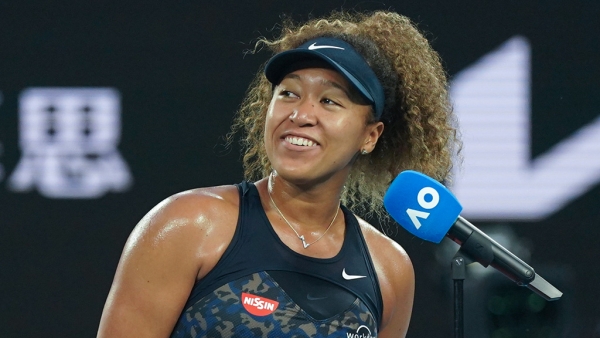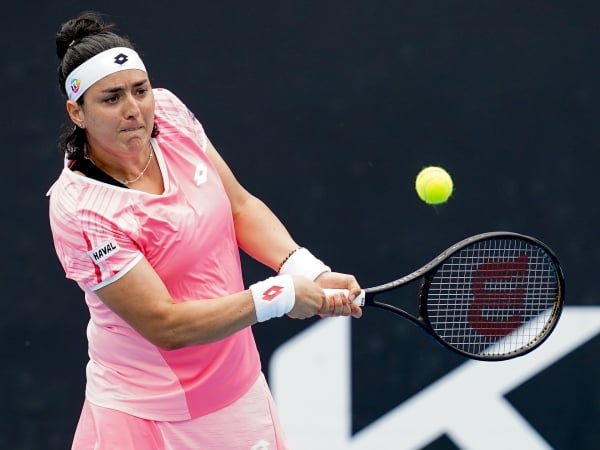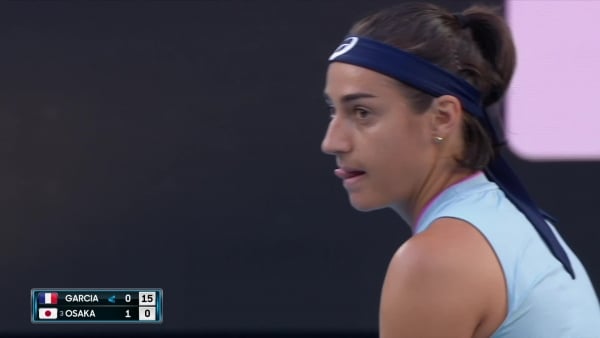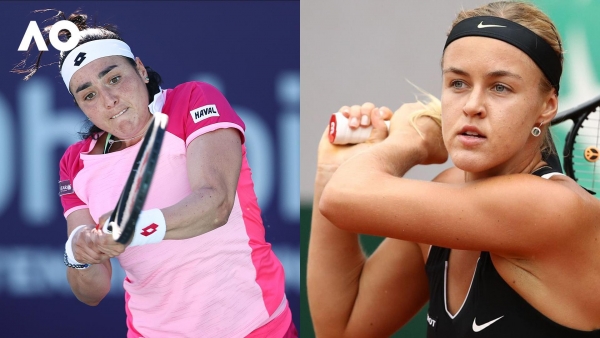Ons Jabeur has made an interesting request from her upcoming third-round opponent Naomi Osaka.
“I asked her to recruit me to her soccer team, I'm still waiting for the contract,” joked Jabeur following her straight-sets win over Anna Karolina Schmiedlova in the second round on Wednesday.
The skillful Tunisian, who last year in Melbourne became the first Arab woman in history to make a Grand Slam quarterfinal, loves to play soccer just as much as she loves tennis, and was happy to learn Osaka has recently become an owner of NWSL side North Carolina Courage.
Jabeur is the queen of banter on tour, and her outgoing personality is what Osaka remembers the most from the first time they hung out at the Rising Stars event that was held alongside the WTA Finals in Singapore in 2015.
“She was just talking to me non-stop,” the Japanese star told reporters back in 2018 when reflecting on that tournament.
“I'm really grateful for her because, like, the amount of shyness that I am right now, back then it was way worse. So, yeah, I mean, even now to this day, she still does some weird stuff around me. For me, the Singapore is Ons.”

Jabeur and Osaka have lots of respect for each other and share a unique responsibility as leaders of women’s tennis in their respective regions.
Osaka, the world No.3, is Asia’s highest-ranked player, while Jabeur has been Africa’s top-ranked woman for many years.
They have both come a long way since their Rising Stars appearance, with Osaka capturing three Grand Slam titles, becoming Asia’s first-ever world No.1 in singles and topping Forbes’ list of highest-paid female athletes on the planet.
At 30 in the world, Jabeur is the highest-ranked Arab woman in history and the 26-year-old is inspired by Osaka’s rise, as well as the stands she has taken against issues like racial injustice.
“She’s such a nice person, she hasn’t changed a bit, which I admire. With someone who wins Grand Slams and she’s a top player but she always says hi,” said Jabeur of Osaka.
“We only played that time, at the Rising Stars, so it would be awesome to play each other again. She’s a tough player and I respect her, on court and outside the court.
“She does inspire me. She’s a leader obviously and she showed that on so many occasions, either on the tennis court or outside and that’s amazing. I feel like I could learn a lot from her.
“I’m trying to inspire the African region. It’s tough but I try my best. She’s really strong mentally, which I appreciate, you can see that in some tough matches.
“It’s amazing to raise the challenge like last year with the masks, it was really amazing. I admire her so much.”

Osaka, who is chasing a second Australian Open crown this fortnight, is carrying a 16-match winning streak into her clash with Jabeur. While she cannot promise her that soccer contract just yet, she is looking forward to their first official showdown on tour.
“It's funny, whenever I bump into her in the halls or anything she always surprises me with something,” said Osaka.
“But, yeah, I don't think I have that much jurisdiction [at NC Courage], but she's super talented in everything she does, so I'm sure if she really wanted to go for it, she could.
“I always felt like watching her she's a player that can do anything, and I always felt like she should be where she is now and even higher.
“I think it's really nice to see her doing well, and I hope that she continues to do well, because for me I feel like she's one of those people that you just love to see grow.
“I just really like her and her personality. I think it's really good for the game.”
Despite the pandemic wreaking havoc with the tennis schedule last year, Jabeur managed to carry the momentum from her breakthrough Australian Open run into the rest of the season. She went on to reach the quarterfinals or better at four more tournaments (Doha, Cincinnati, Lexington, Ostrava) and became the first Arab woman to reach the Roland Garros fourth round in the fall.
Back to the site of her best Grand Slam performance, Jabeur declares she is no longer content by simple reaching the last-eight stage.
“I want to aim really far this time,” said Jabeur, who is 1-4 win-loss against top-10 opposition at the majors.
“Quarterfinal last year brings a lot of good memories. I really want to go for the Grand Slam this time. I’ve been working mentally really hard because of the two weeks quarantine, since I couldn’t go out to play on the court; I was trying to train myself mentally. Honestly, it’s helping me a lot. I hope I can be better on the court, especially against big players.”
Just like Osaka has provided inspiration for Jabeur, the Tunisian has played that role for other Arabs, including Mayar Sherif, who this week became the first Egyptian woman to win a Grand Slam main draw match. Jabeur and Sherif are the only two Arabs and Africans in the world’s top 300 and they’re hoping to see that number rise in the future.
“It’s amazing to see two Arab women in the main draw,” said Jabeur.
“Before it used to always be Malek (Jaziri) and (Mohamed) Safwat – always a Tunisian and an Egyptian, I don’t know why,” she added with a laugh.
“I see Mayar from time to time here and we encourage each other. It feels amazing to have another one from the Arab world to talk to in Arabic. We can support each other. Honestly, I hope we can inspire a lot of the young generation, we can tell them that it’s possible, we’re here, we made, come on you guys, you can make it too.”

